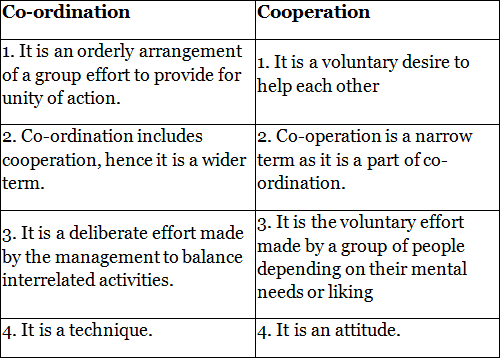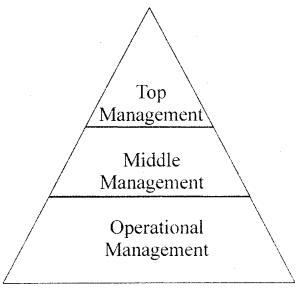Short & Long Answer Questions: Nature and Significance of Management | Business Studies (BST) Class 12 - Commerce PDF Download
Short Answer Questions
Q1: Distinguish between coordination and cooperation.
Ans:
Q2: Write the characteristics of management and explain any two.
Ans: Characteristics The key features of management are –
- Goal-oriented process,
- all-pervasive,
- multidimensional,
- Continuous process,
- group activity
- dynamic function,
- tangible force.
1. Management is a goal-oriented process: Management focuses on achieving specific goals that define an organisation's purpose. These goals should be clear and straightforward.
2. Management is all-pervasive: Management activities are essential across all types of organisations, whether they are economic, social, or political.
Q3: “Lack of proper management results in wastage of time money and efforts.” Do you agree with this statement? Give reasons in support of your answer. (2003)
Ans: Yes, the above-mentioned statement holds as the reasons are as follows.
- Means to accomplishing goals: Management is crucial for achieving group goals, enhancing efficiency, and fostering a dynamic organisation.
- Unified direction: It motivates and directs the workforce by aligning individual efforts with organisational objectives.
- Establishes sound industrial relations: The success of any organisation relies on its workforce. Effective management cultivates a sense of teamwork and loyalty among employees.
- Future preparedness: Good management anticipates future uncertainties, ensuring the organisation's survival and growth. Without this foresight, organisations risk wasting time, effort, and resources.
Q4: State two objectives of management. (1993, 1996, 1998)
Ans: The main two objectives of management are:
- Maximisation of profits at the lowest possible cost.
- Optimum utilisation of resources within the organisation.
Q5: What is meant by Administration? (1992, 1999)
Ans: Administration refers to the process of:
- Determining overall policies
- Setting major objectives
- Identifying general purposes
- Laying out broad programmes
It is fundamentally about making key decisions that guide the direction of an organisation.
Q6: Name any two activities undertaken at the top-level management. (1995, 2001, 2004)
Ans: The two main activities of top-level management are:
- Long-term planning: This involves formulating policies, determining the organisational structure, and controlling operations.
- Maintaining relationships: Top management ensures positive interactions with external parties, such as shareholders and government bodies.
Q7: State two functions of lower-level management. (1992-1994)
Ans: The main functions of lower-level management are:
- To translate the intermediate plans from middle management into daily operating plans.
- To provide direction to employees by assigning tasks, evaluating their performance, and sending progress reports to higher management.
Long Answer Questions
Q1: Do you think proper Management is an important part of an organization?
or
Explain the importance of management.
Ans: Yes, management is a universal activity that is integral to any organization. We now examine some of the reasons that have made management so important.
- Management helps in achieving group goals: Management is required not for itself but for achieving the goals of the organization, the task of a manager is to give a common direction to all.
- Management increases efficiency: The aim of a manager is to reduce costs and increase productivity ” through better planning, organizing directing, staffing, and controlling the activities of the organization.
- Management creates a dynamic organization: All organizations have to function in an environment that is constantly changing.
- Management helps in achieving personal objectives: A manager motivates and leads his team in such a manner that individual members are able to achieve personal goals while contributing to the overall organizational objective.
- Management helps in the development of society: An organization has multiple objectives to serve the purpose of the different groups that constitute it. In the process of fulfilling all these management helps in the development of the organization and through that it helps in the development of society. It helps to provide good ‘ quality products and services, creates employment opportunities, and leads the path towards growth and development.
Q2: Explain the level of management and their main functions.
Ans: Level of Management.
Generally speaking, there are three levels in the hierarchy of an organization.
- Top Management:
They consist of the senior-most executives of the organization by whatever name they are called. They are usually referred to as the chairman, the chief executive officer, chief operating officer, president, and vice-president. Top management is a team consisting of managers from different functional levels. Their basic task is to integrate diverse elements and coordinate the activities of different departments according to the overall objectives of the organization. They are responsible for the welfare and survival of the organization. Their job is complex and stressful. - Middle Management:
It is the link between top and lower-level management. They are subordinate to top managers and superior to the first-line managers. They are usually known as division heads, operation managers, or plant superintendent. They are responsible for implementing and controlling plans developed by top management. At the same time, they are responsible for all the activities of first-line management. Their main task is to carry out the plans formulated by the top management and at the same time, they are responsible for all the activities of first-line managers. - Operational Management:
Foreman and supervisors comprise the lower level in the organization. Supervisors directly oversee the efforts of the workforce. Their authority and responsibility are limited according to the plans drawn by the top management. They play a very important role in the organization since they interact with the actual workforce and pass on instructions of the middle management to the Workers. Through the quality of their efforts of output is maintained. Wastage of materials is minimized and safety standards are maintained.
|
51 videos|230 docs|49 tests
|
FAQs on Short & Long Answer Questions: Nature and Significance of Management - Business Studies (BST) Class 12 - Commerce
| 1. What is the nature of management in commerce? |  |
| 2. Why is management considered significant in commerce? |  |
| 3. What are the key functions of management in a commercial setting? |  |
| 4. How does effective management impact business performance? |  |
| 5. What skills are essential for effective management in commerce? |  |





















